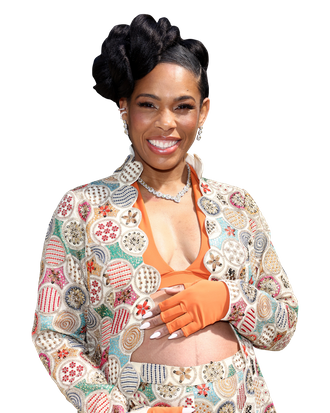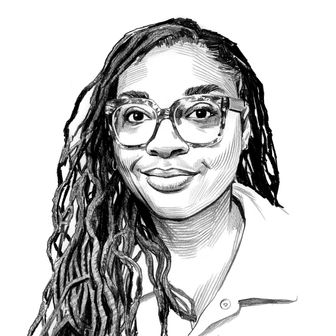
For most of Snowfall’s run, Louie remained a loyal member of the Family. Quick to wield a gun and down to get what she’s owed by any means necessary, Louie was vital to the Family but always remained on the series’ periphery. Until last season. After giving Franklin that The Godfather Part II kiss on her wedding night, Louie became the Fredo to Franklin’s crime boss Michael. Now, thrust into the spotlight for better or worse, Louie is facing the consequences of her decision to break away from Franklin’s empire. Because Snowfall has become so beloved in the Black community, some viewers have taken Louie’s betrayal and ambitions personally — as if she’s become just another Snowfall villain. When last week’s explosive episode ended, Louie had been kidnapped, brutally tortured, and almost sexually assaulted by her opposition. Her husband, Jerome, was killed saving her; online, viewers wished it were Louie who died instead.
Louie’s direction is one that Lewis, a Detroit native with a theater background, pitched for the character herself. She wanted the aunt to become the villain and hoped viewers could recognize what makes Louie, like many great villains, worth listening to. Through Louie’s final chapter, Lewis wants to show that not all villains are evil, not all women are quiet, and Franklin isn’t the only Snowfall mastermind. It’s a natural endpoint to the direction the late, great John Singleton, Snowfall’s co-creator, gave Lewis in the early days of the series. “I’d hear him hollering out, ‘Be more Detroit! Be more Detroit!’” she says. “I realized what he was saying was to be more gritty, be more powerful; you can’t be afraid. I was always asking myself, ‘Can I be more Detroit? Can I be more in my power?’ Because you can’t play Louie scared.”
We need to start with this past episode. It was devastating. What was prepping for that like?
A lot of meditation. A lot of making sure I was doing what I needed to support myself in staying in that moment throughout the whole week. I incorporated some music, I had my little playlist.
We haven’t seen Louie break down to that level. What song would you say is the culmination of all that?
It was probably Alanis Morissette’s “Uninvited.” I felt like Kane wasn’t invited. Franklin wasn’t invited. This attack on Louie was not invited. People can say what they want to say and feel how they want to feel about Louie, but I really do think that Louie is finally able to be her full self. In spite of making Franklin angry, in spite of whatever whoever thinks about the moves she’s making, she’s always very clear and very justified in her actions.
For the first time in her entire life, she can be good at something, know her worth, and demand that others see it or at least respect what it is that she’s bringing to the table. She’s starting to be able to see the vision she has for herself be realized, at least in some capacity, so now this attack, this betrayal, is completely uninvited. She was so close! There’s grief around that, there’s so much anger behind that.
How do you feel about the fan’s response to Louie’s evolution? After the episode, some said she got what she deserved.
I’ve been shocked! Every season before we started shooting, the showrunner would call us in individually and say, “What do you see for your character?” And for four seasons, I would be like I don’t know, just write something good for Louie! But right before season five, I felt like she was at a place where she wasn’t being seen.
The feedback from fans that I’ve been getting is she just wants to be seen, as in she just wants money, she’s greedy, all of these things. I’m like, “No, I think Louie wanted to be seen.” Louie brings a lot to the table. Louie was pivotal from day one of this empire growing. Despite popular belief, Franklin did not build this shit brick by brick by himself. So I said, “You know what? I want Louie to be a villain.”
So you do think she’s a straight-up villain?
Being a villain doesn’t mean you’re not justified in the decisions you’re making. I don’t think Louie is wrong, I just think she’s the opposite of Franklin. They’re actually very similar. She wasn’t asking to be out in front initially, she didn’t start asking until she realized she was undervalued. The difference between Louie and Franklin is that Franklin has temper tantrums and she does not.
Did you draw inspiration from any real-life Black women in the drug game?
I didn’t do any of that kind of research because I felt like that wasn’t going to be how I had access to Louie. I was already like, How am I going to play this? This is not me. I did a deep meditation on Louie, I was really trying to figure out how she got here. What I discovered was that she had been abused her entire life. She didn’t have the same opportunities that I had. How heartbreaking is that?
There’s been a lot of conversation about creating Black female characters who aren’t necessarily aspirational or line up with respectability politics. Do you think Louie aligns with this shift?
I do. We hear all the time, “Black people aren’t a monolith.” We all do different things. We come from different walks of life, we think differently, and we feel differently.
How does it feel to play such a misunderstood character?
I don’t take the hate personally, because I advocated to be a villain. What gets me is the rationale that people have, the logic that’s nonsensical. Like, what show are you watching? What you just said is not what happened?
I think people ride so hard for Franklin that it’s almost clouding their judgment. Do you feel that way?
[Laughs.] There’s no almost! People think that they’re Franklin so they’re watching the show through his perspective. Which is a remarkable thing our writers, directors, and cast were able to do. But if you watch the show objectively, you can’t have those same feelings.
It speaks a lot to the audience of Snowfall and the shortcomings of what we see women as being allowed to do. It’s fascinating, because if her and Jerome’s roles were reversed, I’m not sure it would be the same reaction.
I agree wholeheartedly. I saw a tweet about Louie saying, “A queen needs to learn she needs to sit down and let the men do their business.” I know double standards exist like this, but I’ve been really disappointed. They think Louie did this to Jerome … but Jerome was a grown man! At any point he could’ve said he wants out.
What is it like to be a part of such a beloved show in the Black community?
It’s been an incredible ride and I never saw it coming. When Snowfall came along, I had to do some heavy meditation on whether or not I even wanted to play it. Growing up as a Black theater artist, you sit in your circles in college and New York and you pontificate. One of the subject matters was a Black artist’s responsibility to their community, and how much or how little you should have. Some people feel like, “I’m not responsible to nobody but me.” Some people feel like, “I only do specific work because I’m a mentor.” I think I fall somewhere in the middle.
When I fell in love with Louie and really, really, really, felt like I had to protect her, that’s when I knew if they offered me the role, I was going to take it. I felt like she has been disregarded her whole life, so how do I make sure that as much humanity as I can bring to this character comes to the surface? She can easily be disregarded. It’s easy to see her as Unc’s wife who’s got hands and that’s it. So if I don’t take this role and bring what I’ve found about this woman to the surface, I don’t know if somebody else would do that work. They might just play her as some hood chick that got hands looking cute. I couldn’t bear that.
This interview has been edited and condensed.


